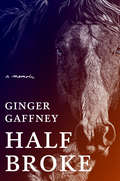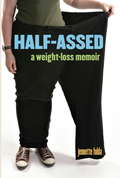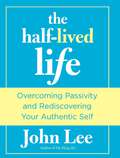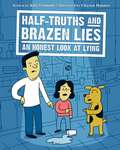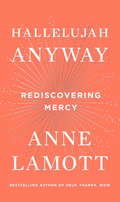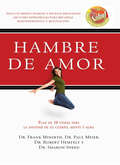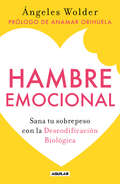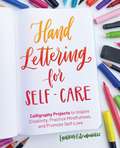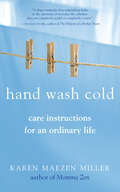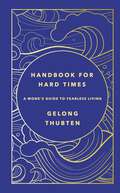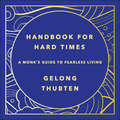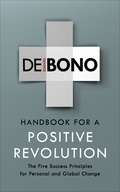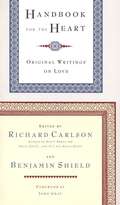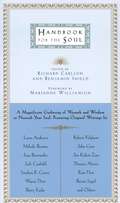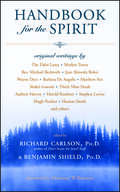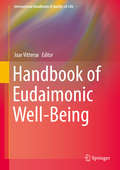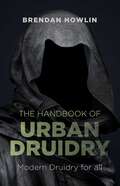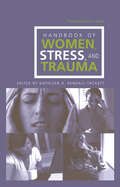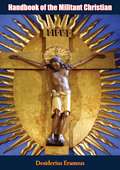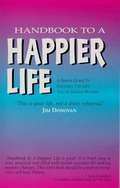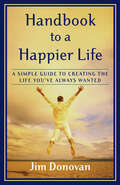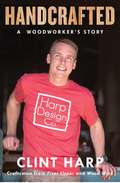- Table View
- List View
Half Broke: A Memoir
by Ginger GaffneyA top-ranked horse trainer’s gorgeous, life-affirming memoir that offers profound insight into the fascinating ways both horses and humans seek relationships to survive. At the start of this remarkable story of recovery, healing, and redemption, Ginger Gaffney answers a call to help retrain the troubled horses at an alternative prison ranch in New Mexico, a facility run entirely by the prisoners. The horses are scavenging through the dumpsters, kicking and running down the residents when they bring the trash out after meals. One horse is severely injured. The horses and residents arrive at the ranch broken in one way or many: the horses are defensive and terrified, while the residents, some battling drug and alcohol addictions, are emotionally and physically shattered. With deep insight into how animals and humans communicate through posture, body language, and honesty of spirit, Gaffney walks us through her struggle to train the untrainable. Gaffney peels away the layers of her own story—a solitary childhood, painful introversion, and a transformative connection with her first horse, a filly named Belle—and she, too, learns to trust people as much as she trusts horses. As her year-long odyssey builds toward a dramatic conclusion, the group experiences triumphs and failures, brave recoveries and relapses, as well as betrayals and moving stories of trust and belonging. Resonant, smart, and beautifully written, Half Broke tears at the heart of what it takes to find wholeness after years of trauma and addiction and offers profound insight on how working with animals can satisfy our universal need for connection.
Half-Assed: A Weight-Loss Memoir
by Jennette FuldaAfter undergoing gall bladder surgery at age twenty-three, Jennette Fulda decided it was time to lose some weight. Actually, more like half her weight. At the time, Jennette weighed 372 pounds.Jennette was not born fat. But, by fifth grade, her response to a school questionnaire asking "what would you change about your appearance" was "I would be thinner." Sound familiar?Half-Assed is the captivating and incredibly honest story of Jennette's journey to get in shape, lose weight, and change her life. From the beginning-dusting off her never-used treadmill and steering clear of the donut shop-to the end with her goal weight in sight, Jennette wows readers with her determined persistence to shed pounds and the ability to maintain her ever-present sense of self.
Half-Lived Life: Overcoming Passivity and Rediscovering Your Authentic Self
by John Lee“So this is my life? What happened to the person I thought I might be at this stage of the game? Where did that person go? Why am I feeling like I’m just treading water, trying to stay one step ahead of my bills and obligations. Anyway, I’m just too tired at this point to try to figure out where that other person went. But I sure expected to be living a different life than this one.”Most people in their forties, fifties, and beyond catch themselves saying something similar to this. Everyone has a mental image of the person they want to be, but few of us actually fulfill these wishes. Once people realize they are living a completely different life than they’d envisioned, they often think it is too late to change and carry on with the same old habits. Too many people settle for a half-lived life. Best-selling author John Lee has long been addressing the fallacy of this attitude in talks and workshops—and now he sets this program into book form. In The Half-Lived Life, he introduces and explains how passivity holds us hostage to old ways of doing things—and provides solutions on escaping this paralyzing state of mind, body, and spirit while increasing our emotional intelligence (EQ). He also shows the freedom to be gained via compassionate assertiveness—an outgrowth of setting boundaries and enforcing limits. Just as Lee’s seminars have successfully led many to find their authentic self in the second half of their life, so too will this book.
Half-truths And Brazen Lies
by Kira Vermond Clayton Hanmer<P>Do you believe in telling the truth? Sure you do. But even that's a lie -- because we all lie. Whether to protect a friend, to make someone feel better, or to avoid telling even bigger lies later, lying is actually central to human nature. Usually we're taught that lying is bad, and that's that. But in reality, it's rarely so black and white. <P>Kira Vermond's latest book answers questions like: Why do we lie? What types of lies are there? What are the consequences of lying? What methods are used to detect lies? And when is it okay or even good to lie? <P>From forgeries and hoaxes to plagiarism and placebos, Half-Truths and Brazen Lies offers historical anecdotes, scientific studies, and sociocultural analyses to help unpack the complex world of untruths. Told in a witty, conversational tone with an index and full-color illustrations, the book takes a thorough, nuanced approach to a fascinating aspect of human behavior.
Hallelujah Anyway: Rediscovering Mercy
by Anne Lamott<P>From the bestselling author of Help, Thanks, Wow and Bird by Bird comes a powerful exploration of mercy, its limitless (if sometimes hidden) presence, why we ignore it, and how we can embrace it. "Mercy is radical kindness," Anne Lamott writes in her enthralling and heartening book, Hallelujah Anyway. <P> It's the permission you give others—and yourself—to forgive a debt, to absolve the unabsolvable, to let go of the judgment and pain that make life so difficult. In Hallelujah Anyway: Rediscovering Mercy Lamott ventures to explore where to find meaning in life. We should begin, she suggests, by "facing a great big mess, especially the great big mess of ourselves." It's up to each of us to recognize the presence and importance of mercy everywhere—"within us and outside us, all around us"—and to use it to forge a deeper understanding of ourselves and more honest connections with each other. <P>While that can be difficult to do, Lamott argues that it's crucial, as "kindness towards others, beginning with myself, buys us a shot at a warm and generous heart, the greatest prize of all." Full of Lamott’s trademark honesty, humor and forthrightness, Hallelujah Anyway is profound and caring, funny and wise—a hopeful book of hands-on spirituality. <P><b>A New York Times Bestseller</b>
Hambre de amor
by Frank MinirthBasado en la premisa que comer en exceso está unido a una privación emocional y espiritual, no solamente a una ansiedad física, Hambre de amor comienza con un inventario sobre sus relaciones que le ayudará a entender como la desilusión con su familia, cónyuge, o con el alimento mismo, puede conducirle a comer en exceso. Este libro le proveerá un programa completo que le servirá para identificar si usted está utilizando el alimento como un sustituto para el amor, la realización de una carrera, o la amistad; dándole entonces, una forma para romper esa adicción. Una vez que usted comience a tratar con la base psicológica de sus problemas alimenticios, usted estará listo para perder peso de manera saludable mediante un plan diseñado por nutricionistas profesionales, que incluye menús diarios y recetas. Este programa también ofrece estrategias para cuando ocurran recaídas, mantener el programa, motivación, y mucho más. Este es un plan integral para el cuerpo, la mente, y el alma.
Hambre emocional: Sana tu sobrepeso con la Descodificación Biológica
by Ángeles WolderQuien lea estas páginas encontrará, sin duda, un enfoque novedoso y muy útil para sanar el sobrepeso y la obesidad. La obesidad y el sobrepeso han sido clasificados como dos de los peores males que azotan a nuestra sociedad. No obstante la gran cantidad de investigaciones y recursos invertidos en encontrar un alivio, no parece hallarse una cura definitiva. Por el contrario, la cada vez mayor cantidad de personas con obesidad es alarmante. Las dietas restrictivas en las que se pasa hambre no funcionan, el cerebro simplemente no las soporta, y tarde o temprano la mayoría de quienes las practican recuperan su peso anterior e incluso lo sobrepasan. ¿Entonces qué se puede hacer? Ángeles Wolder nos propone en este libro una solución radical: escuchar nuestras emociones y aprender a hablar el lenguaje de nuestro cuerpo. Desde la perspectiva de la Descodificación Biológica, cada vez que sufrimos un evento traumático que no podemos enunciar, sufrimos en realidad un conflicto biológico que de una u otra manera ha de expresarse en nuestro cuerpo. ¿Y si la obesidad fuera en realidad el resultado de una serie de emociones no comprendidas y reprimidas? ¿Y si la forma de bajar de peso fuera no la de pasar hambre e imponerse dietas restrictivas, sino expresar aquello que hemos callado y que tapamos con comida?
Hand Lettering for Self-Care: Calligraphy Projects to Inspire Creativity, Practice Mindfulness, and Promote Self-Love
by Lauren Fitzmauricehand lettering; lettering for beginners; letter tracing; letter shaping practice; DIY art projects; arts and crafts activity book; calligraphy training; lettering and modern calligraphy; lettering workbook; lettering books for beginners; hand lettering book for beginners; hand lettering 101; coloring for self care; crafts for anxiety; coloring for anxiety; books for self-care;
Hand Wash Cold: Care Instructions for an Ordinary Life
by Karen Maezen MiillerIt’s easy to think that meaning, fulfillment, and bliss are “out there,” somewhere outside of our daily routine. But in this playful yet profound reflection on awareness, the compelling voice of a contemporary woman reveals the happiness at the bottom of the laundry basket, the love in the kitchen sink, and the peace possible in one’s own backyard. Follow Karen Maezen Miller through youthful ambition and self-absorption, beyond a broken marriage, and into the steady calm of a so-called ordinary life. In her hands, household chores and caregiving tasks become opportunities for self-examination, lessons in relationship, and liberating moments of selflessness. With attention, it’s the little things — even the unexpected, unpleasant, and unwanted things — that count.
Handbook for Hard Times: A monk's guide to fearless living
by Gelong Thubten'Thubten is a very generous and kind monk who writes with the lived honesty and humour of someone who has experienced the wisdom he shares. His writing is full of inspiration but also the pragmatism needed to form a sustainable practice. He clearly illustrates why we all need meditation and mindfulness in our lives.'- Benedict Cumberbatch We all go through hard times. We can experience moments when life feels like an uphill struggle, leading to unhappiness and stress. Perhaps we are feeling sad, anxious, or are challenged to deal with something bigger, such as a bereavement, a loss, a painful ending or a broken heart. It is during these moments when life feels difficult that we could do with some help with our thoughts and feelings.In HANDBOOK FOR HARD TIMES Sunday Times bestselling author of A Monk's Guide to Happiness Gelong Thubten teaches us to understand that happiness, kindness and resilience can be cultivated through reframing life's difficulties as opportunities for transformation. Meditation and mindfulness practices help us to access deep reserves of inner strength as we learn how to 'lean into' our suffering. Thubten suggests how we can find meaning in pain and discomfort, transforming deeply ingrained patterns of fear and resistance.As we discover how hard times can enhance the development of mindfulness, compassion and forgiveness, we can develop a fearless outlook on life and lasting, unshakeable happiness. This approachable and practical book, complete with meditations, is designed for modern times, and will be a valuable resource to anyone during times of struggle, but also during all times to encourage and build resilience and help us find inner contentment and peace.'A most qualified guide in the journey from darkness and turmoil towards inner peace and positivity.'ANNIE LENNOX
Handbook for Hard Times: A monk's guide to fearless living
by Gelong Thubten'Thubten is a very generous and kind monk who writes with the lived honesty and humour of someone who has experienced the wisdom he shares. His writing is full of inspiration but also the pragmatism needed to form a sustainable practice. He clearly illustrates why we all need meditation and mindfulness in our lives.'- Benedict Cumberbatch We all go through hard times. We can experience moments when life feels like an uphill struggle, leading to unhappiness and stress. Perhaps we are feeling sad, anxious, or are challenged to deal with something bigger, such as a bereavement, a loss, a painful ending or a broken heart. It is during these moments when life feels difficult that we could do with some help with our thoughts and feelings.In HANDBOOK FOR HARD TIMES Sunday Times bestselling author of A Monk's Guide to Happiness Gelong Thubten teaches us to understand that happiness, kindness and resilience can be cultivated through reframing life's difficulties as opportunities for transformation. Meditation and mindfulness practices help us to access deep reserves of inner strength as we learn how to 'lean into' our suffering. Thubten suggests how we can find meaning in pain and discomfort, transforming deeply ingrained patterns of fear and resistance.As we discover how hard times can enhance the development of mindfulness, compassion and forgiveness, we can develop a fearless outlook on life and lasting, unshakeable happiness. This approachable and practical book, complete with meditations, is designed for modern times, and will be a valuable resource to anyone during times of struggle, but also during all times to encourage and build resilience and help us find inner contentment and peace.'A most qualified guide in the journey from darkness and turmoil towards inner peace and positivity.'ANNIE LENNOX
Handbook for Hard Times: A monk's guide to fearless living
by Gelong Thubten'Thubten is a very generous and kind monk who writes with the lived honesty and humour of someone who has experienced the wisdom he shares. His writing is full of inspiration but also the pragmatism needed to form a sustainable practice. He clearly illustrates why we all need meditation and mindfulness in our lives.'- Benedict Cumberbatch From the author of the Sunday Times bestseller A Monk's Guide to Happiness, this audiobook aims to help listeners discover a creative, transformative approach to dealing with life's challenges and difficulties.We all go through hard times. We can experience moments when life feels like an uphill struggle, leading to unhappiness and stress. Perhaps we are feeling sad, anxious, or struggling to deal with something bigger, such as a bereavement, a loss, a painful ending or a broken heart. It is during these challenging times that we could do with some help with our thoughts and feelings.In HANDBOOK FOR HARD TIMES The Sunday Times bestseller Gelong Thubten will guide us to understand that happiness, kindness and resilience can be cultivated through embracing life's difficulties as opportunities for transformation. Meditation and mindfulness practices help us to access deep reserves of inner strength as we learn how to 'lean into' our suffering. Thubten suggests how we can find meaning in pain and discomfort, transforming deeply ingrained patterns of fear and resistance.As we discover how hard times can enhance the development of mindfulness, compassion and forgiveness, we can develop a fearless outlook on life and lasting, unshakeable happiness. This approachable and practical audiobook is designed for modern times, and will be a valuable resource to anyone during times of struggle, but also during all times to encourage and build resilience and help us find inner contentment and peace.(P) 2023 Hodder & Stoughton Limited
Handbook for a Positive Revolution: The Five Success Principles For Personal And Global Change
by Edward De BonoHandbook for the Heart: Original Writings on Love
by John Gray Richard Carlson Benjamin Shield“Handbook for the Heart offers a refuse from and illuminates the joys to be gained from your life in innumerable positive ways.” — from the Foreword by John Gray What is love? Why is it central to our happiness and personal growth? And how can we find it, nurture it, express it, keep it alive? In Handbook for the Heart, thirty-four of today’s best-known spiritual teachers provide us with answers—and illuminate the many ways we can I ill our lives with love. The author of Don 't Sweat the Small Stuff... an d It 's All Small I Stuff and Don't Worry, Make Money, as well as other bestselling hooks, Richard Carlson, Ph.D., is a practicing therapist and frequent lecturer on happiness and stress reduction. Benjamin Shield, Ph.D., is an educator, lecturer, and therapist who has written numerous articles on psychology, healing and spirituality. Together, Carlson and Shield created and edited the bestselling Handbook for the Soul, Healers on Healing, and For the Love of God. Cover design by Leslie Goldman Author photographs by Personal Touch Photo (Richard Carlson) and Thomas Lascher (Benjamin Shield)
Handbook for the Soul
by Richard Carlson Marianne Williamson Benjamin ShieldAmerica's most celebrated spiritual writers offer inspiring words on the state of the soul today. This collection of more than thirty original essays addresses both the importance of caring for and nourishing the soul and the ways in which these individuals tend to their own souls on a day-to-day basis.
Handbook for the Spirit
by Richard Carlson and Benjamin ShieldFrom bestselling editors Richard Carlson and Benjamin Shield, Handbook for the Spirit (formerly titled For the Love of God) features a wonderfully diverse collection of original spiritual writings by: A.H. Almaas · Rev. Michael Beckwith · Sue Bender · Jean Shinoda Bolen · The Dalai Lama · Barbara De Angelis · Wayne Dyer · Riane Eisler · Matthew Fox · Shakti Gawain · Joseph Goldstein · Andrew Harvey · Barbara Marx Hubbard · Rabbi Harold Kushner · Stephen Levine · Father William McNamara · Brooke Medicine Eagle · Howard Murphet · Hugh Prather · Anne Wilson Schaef · Marsha Sinetar · Huston Smith · Brother David Steindl-Rast · Mother Teresa · Thich Nhat Hanh
Handbook of Creativity
by Robert J. SternbergThe goal of this handbook is to provide the most comprehensive, definitive, and authoritative single-volume review available in the field of creativity. The book contains twenty-two chapters covering a wide range of issues and topics in the field of creativity, all written by distinguished leaders in the field. The volume is divided into six parts. The introduction sets out the major themes and reviews the history of thinking about creativity. Subsequent parts deal with methods, origins, self and environment, special topics and conclusions. All educated readers with an interest in creative thinking will find this volume to be accessible and engrossing.
Handbook of Eudaimonic Well-Being
by Joar VittersøThis handbook presents the most comprehensive account of eudaimonic well-being to date. It brings together theoretical insights and empirical updates presented by leading scholars and young researchers. The handbook examines philosophical and historical approaches to the study of happy lives and good societies, and it critically looks at conceptual controversies related to eudaimonia and well-being. It identifies the elements of happiness in a variety of areas such as emotions, health, wisdom, self-determination, internal motivation, personal growth, genetics, work, leisure, heroism, and many more. It then places eudaimonic well-being in the larger context of society, addressing social elements. The most remarkable outcome of the book is arguably its large-scale relevance, reminding us that the more we know about the good way of living, the more we are in a position to build a society that can be supportive and offer opportunities for such a way of living for all of its citizens.
Handbook of Inclusive Education
by Central Board Of Secondary EducationThe Constitution of India emphasizes the importance of equality of status and opportunity for all citizens, and institutions like CBSE have a duty to support and inspire every child to succeed. In order to promote inclusivity in schools and ensure that children with special needs are accommodated, CBSE has made it mandatory for schools to provide disability-specific learning aids, alternate pedagogies, and exam concessions. To disseminate accurate information on these provisions, CBSE has created a handbook for teachers that provides guidance on identifying children with special needs, creating a barrier-free environment, using instructional designs and assistive technologies, and conducting assessments. While the handbook follows a generic approach, it can be adapted to suit the needs of different contexts and target groups. CBSE believes that the tools and techniques outlined in the handbook will be useful for teachers and will increase access, equity, and participation of all children in the learning process.
Handbook of Urban Druidry: Modern Druidry for All
by Brendan HowlinDruidry is currently exciting much interest but has an image that is not usually associated with urban life. In The Handbook of Urban Druidry, author Brendan Howlin presents Druidry in an easy-to-understand way, making the concepts open to everyone.
Handbook of Women, Stress and Trauma (Psychosocial Stress Series #Vol. 30)
by Kathleen A. Kendall-TackettThe Handbook of Women, Stress and Trauma focuses on the stresses and traumas that are unique to the lives of women. It is the first text to merge research from the fields of trauma and women's health and development. Using a lifespan developmental approach, the text begins by addressing specific issues women face in their lives, drawing upon theories of development and exploring how women's relationships with others buffer - or sometimes cause - stress and trauma. Combining aspects of female development with empirical data from the fields of women's health, family violence and stress and coping, this volume helps sensitive care providers to the specific needs of women exposed to traumatic events.
Handbook of the Militant Christian
by Desiderius ErasmusHandbook of the Militant Christian (Latin: Enchiridion militis Christiani), which has also been translated as Handbook of a Christian Knight and The Manual of a Christian Knight, is a work written by Dutch scholar Desiderius Erasmus of Rotterdam in 1503. First published in English in 1533 by William Tyndale, this is the 1962 English edition by John Patrick Dolan.During a stay in Tournehem, a castle near Saint-Omer in the north of modern-day France, Erasmus encountered an uncivilized, yet friendly soldier who was an acquaintance of Battus, Erasmus’ close friend. On the request of the soldier’s pious wife, who felt slighted by her husband’s behaviour, Battus asked Erasmus to write a text which would convince the soldier of the necessity of mending his ways, which he did. The resulting work was eventually re-drafted by Erasmus and expanded into the Enchiridion militis Christiani. The Enchiridion is an appeal on Christians to act in accordance with the Christian faith rather than merely performing the necessary rites. It became one of Erasmus’ most influential works.
Handbook to A Happier Life
by Jim DonovanThe author of this book donated a digital copy to Bookshare.org. Join us in thanking Jim Donovan for providing his accessible digital book to this community.
Handbook to a Happier Life: A Simple Guide to Creating the Life You've Always Wanted
by Jim DonovanWhen Jim Donovan's successful career in video and broadcast television led to a personal meltdown, he went through rehab, pulled himself up from the bottom, and started his life over. He then began giving seminars on "how to change your life" based on the simple, yet effective, ideas that had worked for him in recovery. From these seminars evolved the stories and advice in this book. Don't make big changes, Donovan suggests; just start slowly and move bit-by-bit toward your goal. In addition to goal setting and goal keeping, Donovan discusses writing personal affirmations that work, cultivating gratitude, disciplining the mind, and helping others to achieve their dreams.
Handcrafted: A Woodworker's Story
by Clint HarpClint Harp, maverick carpenter on HGTV’s smash hit Fixer Upper and the star of Wood Work on the DIY Network, presents his inspirational memoir that celebrates meaningful work, turning your craft into a career, and recognizing the importance of the journey itself.While Clint Harp is now known as Chip and Joanna Gaines’s go-to table maker on Fixer Upper and a nationally acclaimed artisan, his life has not always been the DIY dream we see on the show. Ten years ago, he played the role of what he thought was a good husband, father, and provider, dutifully working at a sales job that came with a healthy paycheck. Yet he kept coming back to his unfilled dream of building furniture. With the support of his wife, the encouragement of a mentor, and a life full of lessons, he finally took the leap, quit his job and set out on a quest to become a carpenter. Without formal training, financing, workspace, or customers, the Harps were quickly on the edge of financial collapse. Than Clint met Chip Gaines at a gas station—a chance encounter that marked the next chapter on a wild ride Clint and his wife, Kelly, wouldn’t have imagined possible. Spanning Clint’s remarkable journey—from a childhood learning carpentry and hard work at his grandfather’s knee, through his struggles to balance pursuing his dreams with supporting his family, to his partnership with Chip and Joanna Gaines and the many adventures and misadventures of filming Fixer Upper—Handcrafted is part memoir and part manual for dreamers. Clint provides unvarnished, thoughtful reflections on a path that is possible for anyone bold enough to pursue it.
